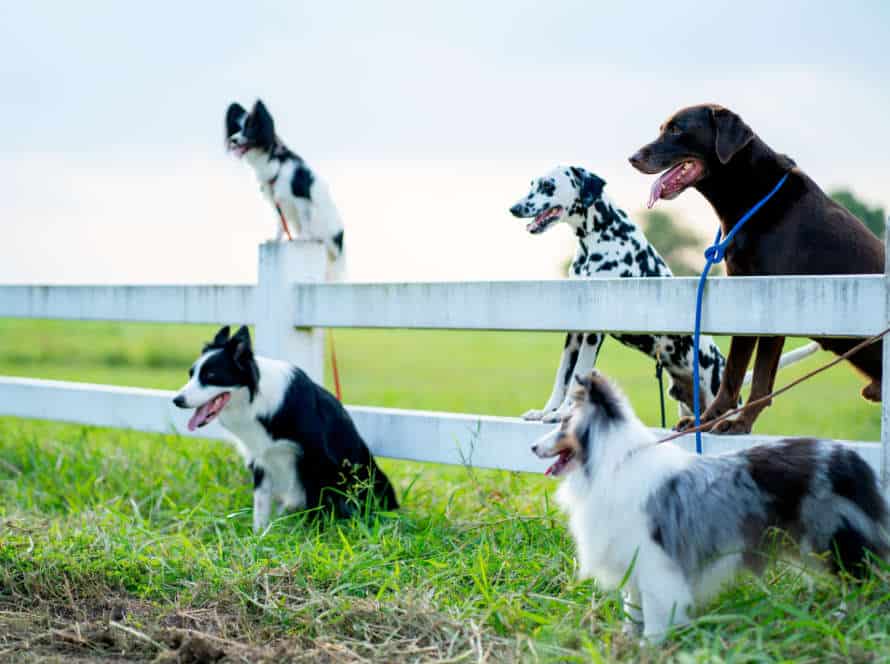Small vs. Large Breeds: Pros and Cons
When it comes to deciding between small and large breeds of dogs, there are pros & cons. Small breeds, like Chihuahuas & Shih Tzus, need less care for feeding, grooming & exercise – plus they’re good for small spaces. But large breeds, like Great Danes & Saint Bernards, need more space, food & exercise – plus they’re loyal & loving.
It depends on you. Do you want a low-key companion? Go small. Do you love outdoor activities with larger pets? Go large. It’s all up to you – your personality, lifestyle & living arrangements.
Advantages of Small Breeds
Smaller dog breeds come with multiple benefits. They are easy to train, need less living space, and are generally more tolerant of kids. Also, they are more portable and don’t need much exercise. In this article, we will look at the advantages and disadvantages of owning a small dog.
Lower Cost of Care
Small dogs can be much more affordable to take care of than large breeds! Here’s why:
- Food costs are lower, since they need less.
- They don’t need much space – it’s easy to keep them comfy in small places like apartments.
- Vet bills are cheaper, since they’re less likely to have health issues.
- Grooming is simpler and costs less too.
Before picking a pup, think about your lifestyle and needs carefully. Compare small and large breeds and decide which fits best.
Pro Tip: Give them the best food, exercise, and healthcare. That’ll keep ’em happy and healthy!
Greater Adaptability to Small Living Spaces
Small animals like cats and dogs are great for those with small living spaces. They need less maintenance and space. Advantages include:
- Lower Maintenance: Grooming and exercise not needed as much.
- More Space: Fitting in smaller areas.
- More Affordable: Feeding and medical expenses lower.
Large breeds have their own pros too, such as size and strength for security. It depends on your lifestyle and preferences which to choose.
Fewer Health Problems
Small doggos have some benefits over bigger breeds. They have fewer health issues and adjust better to apartments. But, people often go for bigger dogs for their strength, protectiveness, and activity.
Smaller pups have benefits too! They live longer and have a lower chance of getting serious ailments like hip dysplasia, arthritis, and cancers. They also fit better in apartments and need less exercise. However, little pooches may have trouble with toilet-training and oral health.
So, it’s best to pick a doggo based on your life and what you prefer. With the right training and care, both small and big breeds make good companions.
Disadvantages of Small Breeds
Smaller dogs need more trips to the vet. This is because they’re more prone to health problems. Plus, their smaller size means they’ll cost more to look after. Unfortunately, they also don’t live as long as bigger breeds. Here’s more info on the cons of small breeds.
More Frequent Accidents
Small dog breeds have higher chances of accidents, due to their tiny size and delicate bones. There are both advantages and disadvantages to having a small breed. Here are some reasons why they may be more prone to accidents:
- Falls: Easily falling due to their fragile bones.
- Predation: Being preyed on by larger animals such as coyotes, hawks, and other predators.
- Health issues: Prone to respiratory problems, dental issues, and eye infections.
Knowledge of these risks can help pet owners take preventive measures to keep their small dogs safe. Though extra care and attention may be needed, small breeds offer many benefits too. Such as: being easier to handle, cheaper to maintain, and perfect for apartment living.
Fragility and Susceptibility to Injury
Owning a small breed dog has both advantages and disadvantages. They may be fragile and more susceptible to injury than larger breeds. To keep them safe, extra care and attention is needed. They are also more sensitive to harsh conditions and extreme temperatures.
On the plus side, small breeds can be easily adapted to living in small spaces. They require less maintenance and cost less to maintain. It is essential to carefully consider the pros and cons of owning a small breed dog and take precautions to keep them healthy.
Higher Levels of Anxiety and Fearfulness
Small dog breeds have a major disadvantage – they can be anxious or fearful. This can lead to behavioural issues and health concerns.
Why? Because they are bred to be companion pets. So, they become close to their owners. This can make them worry when left alone, causing them to bark or whine.
Small breeds can also be scared of unfamiliar people, animals, and places. This can make them aggressive or hide.
Plus, some small dogs have genetic health problems that can lead to anxiety or fear, like dental issues or noisy breathing.
Advantages of Large Breeds
Large breed dogs bring many benefits! Safety, exercise, and agility are just a few. A sense of security comes with their size, as their intimidating presence can ward off intruders. Plus, their larger size makes them more visible in the home and takes up more space.
Let’s take a deeper look into the perks of owning a large breed pup!
Affectionate and Gentle Giants
Big doggies are often cuddly and kind giants! They provide many benefits to their owners compared to small breeds. A laid-back personality makes them ideal for families with kids and other animals. Plus, they require less exercise and are easier to train!
Here’s more pros of having a large breed pooch:
- Great guard dogs and give a sense of security.
- Loyal and protective.
- Live longer and less health problems than small breeds.
However, large breeds come with some challenges, like higher food/medical expenses and needing more space. But, the perks they bring make the investment worthwhile!
Serve as Great Guard Dogs
Large breed dogs are often considered great guard dogs. This is because of their size, strength, and intimidating presence. But there are other advantages to having a big breed.
- Protection: They can protect their family from harm. They can keep watch over their territory and confront unwelcome visitors.
- Exercise: They require a lot of exercise, making them great companions for people who like to be active.
- Loyal: They are loyal and devoted to their family. They are protective of children and their owner’s property.
However, large breeds come with unique challenges such as space requirements, potential health issues, and higher costs. So, make sure to think about your lifestyle and which breed will be the best fit.
More Suited for Activities like Hiking and Running
Big doggos are ideal for activities like hiking and running due to their strong muscles and energy levels. Their lungs are also bigger, helping them excel in endurance-based activities.
German Shepherds, Great Danes and Boxers are some large breeds that have been bred for physical activity. They need lots of exercise to stay healthy and happy.
Plus, they make great protectors of their owners and have been used to guard livestock and property. So, if you are looking for a loyal companion, big breeds are the way to go!
Though training them needs effort, their loyalty and love are worth it.
Disadvantages of Large Breeds
Huge breeds may have their special benefits, however they can likewise accompany a couple of disservices. One of the greatest hindrances is their size. Bigger breeds need more space than smaller ones – this can be challenging to provide in a house. Additionally, more upkeep is required, particularly for exercise and grooming – these can’t be dealt with easily using a brush. Furthermore, more cash is typically needed for food, vet bills, and other related expenses.
High Cost of Care and Maintenance
Large breeds of dogs can be costly to look after and maintain. This makes them less desirable for some pet owners. Pros and cons of large breeds: higher expenses for food, grooming and vet visits. Plus, they need more living space and exercise.
Large breeds need more good quality food to stay healthy. This can be a big expense. Grooming costs can be higher too – because of the coat. And larger dogs can get health issues more often, so vet visits can be more frequent. Prospective dog owners must research and evaluate the costs and responsibilities before getting a large breed pet. Top tip: make sure you can give them the best care.
More Space and Special Safety Precautions Required
Bigger dog breeds may look impressive and make good pals, but they also have some downsides. One of these is the amount of space needed. They require more room to move and play. This can be tricky if you live in a small flat or don’t have a yard. Also, you’ll need bigger crates, beds, and toys for them.
Safety must also be taken seriously. Bigger dogs can accidentally knock over little children or elderly people, or get too excited during play and hurt someone. Plus, they are more likely to have health issues like hip dysplasia or bloat.
So, before bringing a large breed into your home, think about these things.
Health Issues like Hip Dysplasia and Bloat
Bigger breeds of dogs may have certain health issues that can diminish their quality of life. Two common problems observed in larger breeds are Hip Dysplasia and Bloat.
Hip Dysplasia: This is a developmental issue that affects the hip joint. It involves pain, inflammation, and reduced mobility. Breeds such as German Shepherds and Great Danes are more prone to this.
Bloat: Also known as gastric torsion or twisted stomach, Bloat can be life-threatening. It happens when a dog’s stomach fills with gas and twists on itself. It causes severe pain, difficulty in breathing, and even death. Breeds such as St. Bernards and Dobermans, with deep chests, are more at risk for Bloat.
Though Large breeds have their own difficulties, they also have positives, such as being good watchdogs and very lovable. Owners must give extra attention to ensure their Large breeds remain happy and healthy, by being aware of the health risks.
Frequently Asked Questions
1. What are the pros of owning a small dog?
Small dogs are typically easier to care for and require less exercise, making them a great option for apartment living or for people with busy schedules. They also tend to be more portable and easier to travel with.
2. What are the cons of owning a small dog?
Small dogs can be more prone to health problems, such as dental issues or tracheal collapse, and can be more difficult to train. They may also have a higher energy level and require more intentional socialization to prevent aggression or anxiety.
3. What are the pros of owning a large dog?
Large dogs can be great for families and make excellent protectors. They often have a more relaxed demeanor and can be easier to train due to their attentiveness and intelligence.
4. What are the cons of owning a large dog?
Large dogs require more space, exercise, and food – which can be more expensive. They may also be more difficult to handle on walks or in public areas and may have a shorter lifespan.
5. What breeds fall into the small category?
Some popular small breed dogs include Chihuahuas, Pomeranians, Shih Tzus, and Yorkshire Terriers.
6. What breeds are considered large?
Large breed dogs include Great Danes, St. Bernards, Mastiffs, and Labrador Retrievers.







